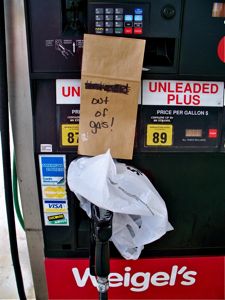
RAND SIMBERG ON ECONOMIC ILLITERACY AND TALK OF “PRICE GOUGING:” “Every time we have a natural disaster like this, this idiotic topic comes up, and we once again have to explain Econ 101 to the products of our public school system, probably in futility. This time, it’s Rich Hailey’s turn.” Yeah, if only big TV networks with high-paid staffs could do the kind of reporting and analysis that we see from lone amateur bloggers.
Rand also notes:
Jeez, I thought that David Asman was smarter than that. Now he’s telling Fox viewers to take pictures of stations with high gas prices so that they can be reported to authorities. It’s hard for me to believe that Neal Cavuto would do that. . . .
You know, I think that this is an explanation for socialism and collectivism’s continuing grip on the public mind, despite its long history of unending failure. There’s just something in human psychology to which it naturally appeals, and rationality just can’t break through. It just “feels” unfair for prices to go up in an emergency, regardless of the demonstrably bad consequences of attempting to legislate them.
Yeah. But I do know that in order to “gouge” you have to have something to sell. So here’s my gas station photo. I passed four gas stations on Kingston Pike earlier today. Two were out of gas, one was out of premium, and one had nothing but regular left. Nobody’s making money selling gas they don’t have.
I’d encourage people to send me pictures of clueless TV news anchors but, really, I don’t have that much space here . . . .
UPDATE: More thoughts from Shannon Love: “I’ll say it one more time for those who can’t be bothered to actually ask someone who owns a gas station. Gas stations set prices for the gas they sell today based on the wholesale price of the gas they will have to buy to replace it. Get it? The price you pay for a gallon today is the cost of the gallon the station will have buy to replace the one you just bought. Gas stations sell gas at or near cost, so if they did not use replacement pricing any sudden spike in gas prices would shut them down and you couldn’t get any gas. I simply do not know why our public and private talking heads cannot understand and communicate this simple fact.”
ANOTHER UPDATE: More here:
As for fuel availability, Pilot hasn’t run out at any of its stores, but is struggling to make sure supplies remain constant. A fuel shipment from Colonial Pipeline’s main trunk into Knoxville that was originally slated to arrive Saturday, then was postponed until Tuesday, has now been pushed back to Thursday, Wright said.
The problem now is not just less fuel coming from the refineries, but a run on the pumps by drivers, he said.
“The fuel situation for Pilot really hasn’t changed a whole lot since yesterday. We have fuel right now and we continue to deliver fuel to our stores; the problem we have is we are selling about twice as much fuel as we normally would,” he said. . . .
Pilot isn’t the only local gasoline retailer watching the fuel situation deteriorate.
“I’ve been in this business 50 years and this has never happened before,” said Bill Weigel, head of the Weigel’s chain of convenience stores in Knox, Blount, Sevier, Loudon, Anderson and Monroe counties.
Weigel, who said Thursday that about a half-dozen Weigel’s stores had run out of gas, declined to say how many more stores had run dry Friday.
“It’s worse today than yesterday, and it will probably be worse tomorrow,” he said Friday.
Weigel and other retailers have been scouring the country for fuel supplies since Gustav left refinery outages along the Gulf Coast, creating severe shortages. With Ike reaching landfall at Galveston and Houston, the heart of the country’s petroleum manufacturing industry, some fear a worst-case scenario for retailers and consumers.
Weigel said Friday afternoon he had found a supply of gasoline in Birmingham, Ala., and was afraid to find out what it was going to cost him. He had to pay $4.49 a gallon for the last batch he bought.
Spot-market prices are much higher in places. One problem is that — as with electrical production — there’s not a lot of slack left in the system. More refineries would help . . . .
Of course, some are blaming the media: “Why is it that local news (both print and television) feels the need to try and scare the crap out of everyone on a regular basis. The paper runs a story about fuel shortages, and then runs another story about a “run on the pumps”. Brilliant. I wonder how much gas prices would have increased if there hadn’t been a media blitz with constant radio updates of how bad it was getting?”
